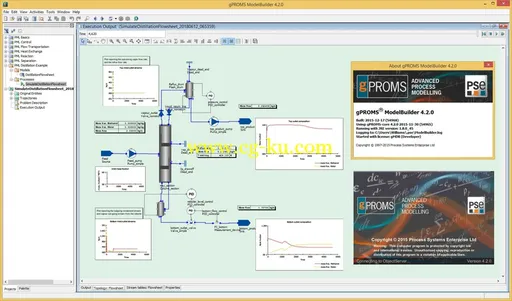
PSE gPROMS ModelBuilder 4.2.0 | 191.7 mb
Process Systems Enterprise (PSE) is pleased to announce the availability of gPROMS ModelBuilder 4.2. This release is built on the new gPROMS platform 4.2, which contains many enhancements for flowsheeting users, increases in numerical power, usability enhancements and improvements in physical property handling.
gPROMS ModelBuilder version 4.2 contains improvements and enhancements in the following areas:
Flowsheeting
- The responsiveness of the GUI has been improved in several areas, particularly within the opening of large flowsheets, launching of gPROMS activities, consistency checking and live propagation after edit operations.
- The tool for choosing user-friendly names (PMA Chooser) have been extended to cover the graphical editors for schedules and tasks.
- Case files (also known as 'Result cases') have become much smaller, leading to significantly reduced loading times, an effect which is particularly noticeable for very large case files.
- A new project property, ‘Store creation and modification timestamps’, has been introduced. This property allows for timestamps to be turned off or on, at project level. If turned off, it facilitates, together with a number of other internal changes, to more easily trace content changes between different versions of gPROMS project files. The new property is accessible from the properties tab of a project (see the screenshot below) and it should be unchecked to avoid all creation and modification timestamps.
- The layout and structure for the definition of user preferences have been improved.
- Units on a topology can be moved by using the keyboard with the Alt-
Solution power
- A new DAE solver, DAEBDF, has been introduced for simulation activities. It offers improved robustness and increased performance for many models.
- The kernel performance has been increased by making the residual and Jacobian evaluation more efficient. This performance improvement can reduce CPU time by up to 30% for certain models at a small cost of slightly increased memory usage.
- Automatic model pruning has been extended to remove time-invariant sub-systems.
- A number of issues related to model initialisation procedures have been resolved.
- The termination criteria for mixed integer optimisation have been improved to allow for a distinction between convex and non-convex problems.
- Effectiveness of Saved Variable Sets (SVS):
. Restoring data for continuous domains is more flexible when the domains have been changed between saving and restoring an SVS. In such a case, the restoration will attempt to interpolate as much as is mathematically meaningful.
. Stored values of continuous domains now can be used directly in assign or initial sections of a process.
. Values distributed over ordered sets, for example a set of chemical components, are now correctly restored if the set is changed between saving and restoring an SVS.
This set of improvements applies to SVS that are created with gPROMS v4.2.
Physical properties
- Multiflash has been upgraded to version 4.3.52. The performance and robustness of the interface have been enhanced, and new methods have been added.
- gSAFT has been upgraded to v3.1.0 with more methods and components.
Software components
- gO:MATLAB is now included in all gPROMS-based products.

About gPROMS ModelBuilder.
gPROMS ModelBuilder is an environment for expert modellers to build, validate and execute steady-state and dynamic process models and deploy these across the organisation.
It provides all the facilities of the gPROMS advanced process modelling platform for creating and managing custom models, from single units such as novel reactors to entire corporate process simulation and optimisation environments.
Build, validate, execute, deploy
The gPROMS platform's powerful process modelling language allows expert modellers to create custom process models of virtually any level of complexity, and validate these against experimental or plant data using built-in advanced parameter estimation techniques.
Models can be combined with other custom or library models within a process flowsheet. You can then apply the gPROMS platform's steady-state and dynamic simulation and industry-leading optimisation capabilities to generate high-accuracy predictive information for decision support in product and process innovation, design and operation.
Library management capabilities allow easy supply of models to users across the organisation. Models can be protected (encrypted) for security and quality assurance purposes.
About Process Systems Enterprise (PSE).
PSE is the world's leading supplier of Advanced Process Modelling technology and related model-based engineering and innovation services to the process industries.
We help our customers to create value in their organisations through the application of advanced process modelling using our gPROMS platform technology. This enables them to explore the process decision space rapidly, reduce uncertainty and make better, faster and safer design and operating decisions through deeper understanding of their processes.
The result is accelerated innovation with faster time-to-market, improved process and product design, enhanced operations, more efficient and effective R&D and experimental programmes, and better-managed risk
Product:
PSE gPROMS ModelBuilder
Version:
4.2.0.54968
Supported Architectures:
x86
Website Home Page :
http://www.psenterprise.com
Language:
english
System Requirements:
PC
Supported Operating Systems:
Windows 7even or newer
Size:
191.7 mb


发布日期: 2018-06-24